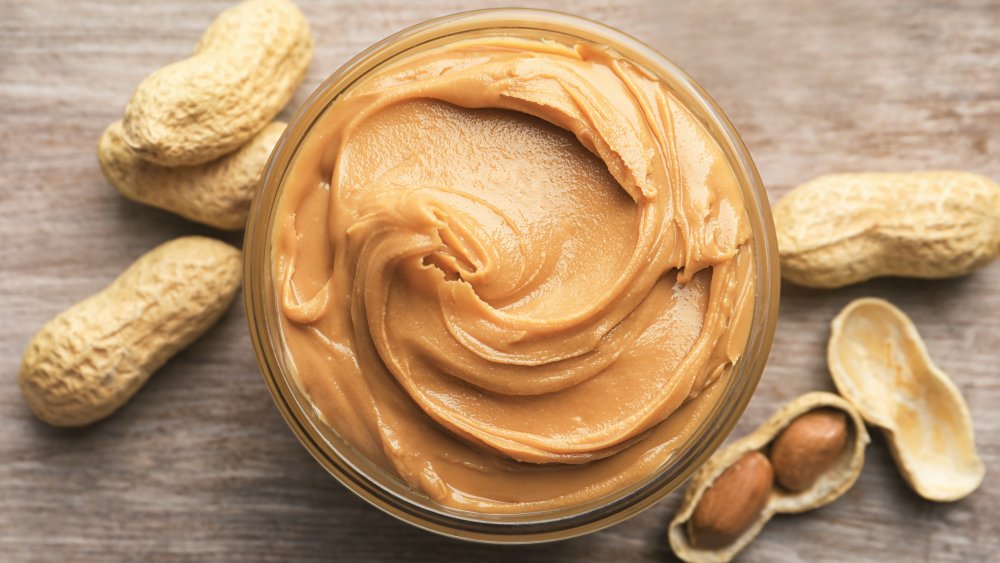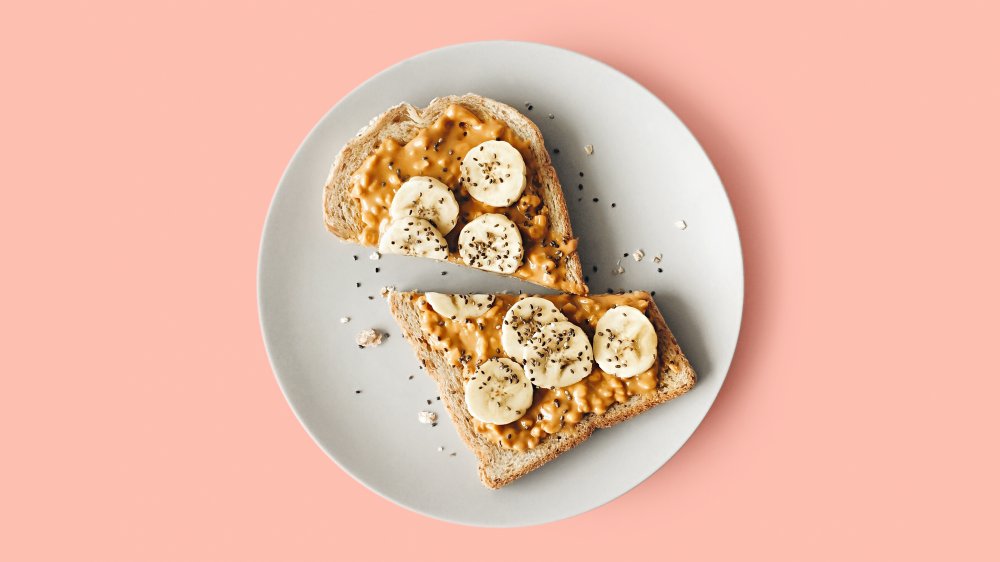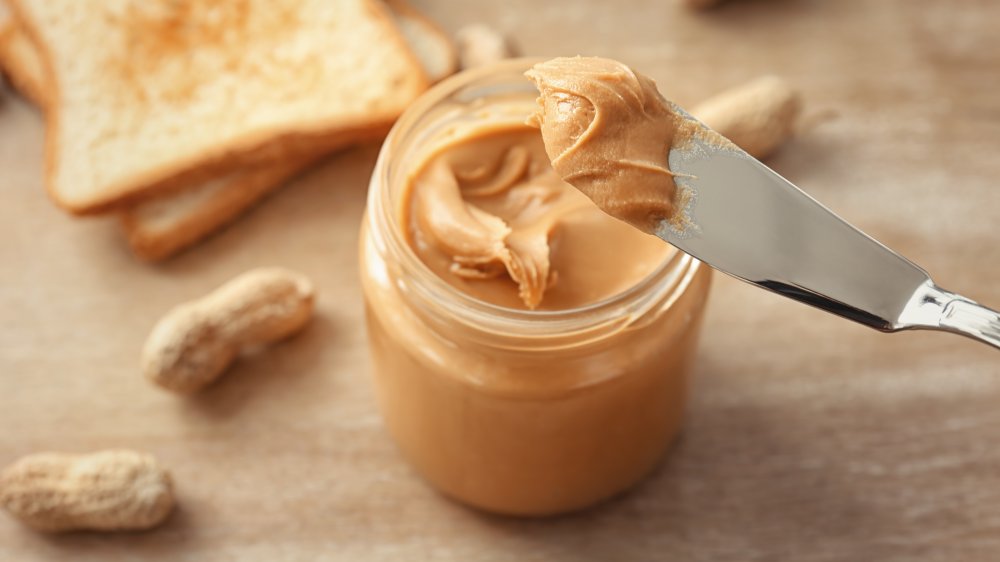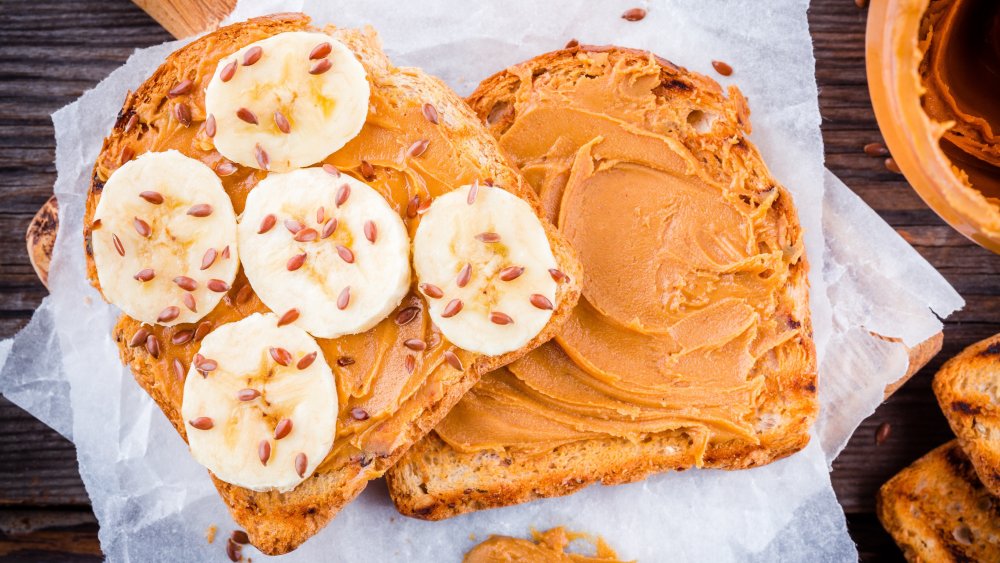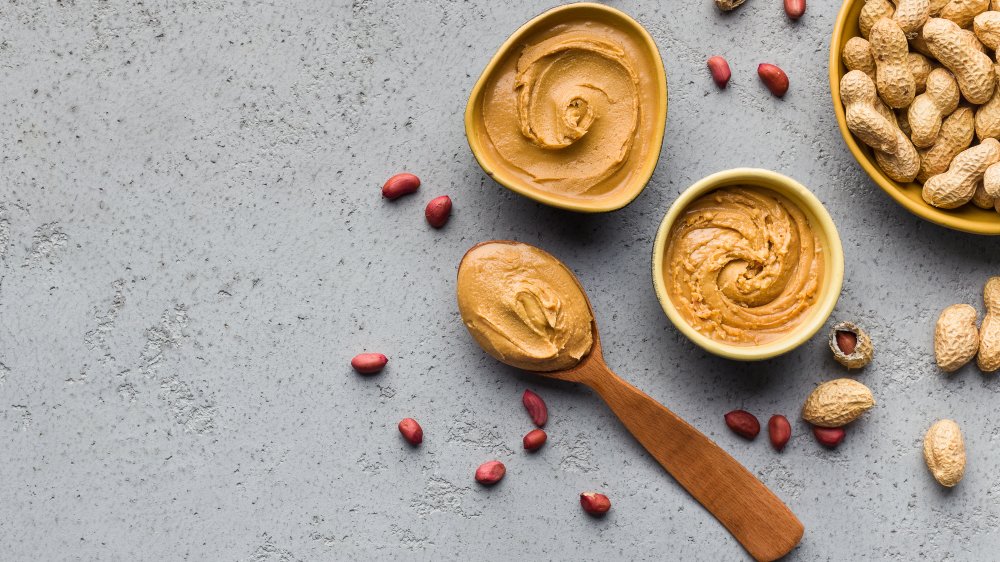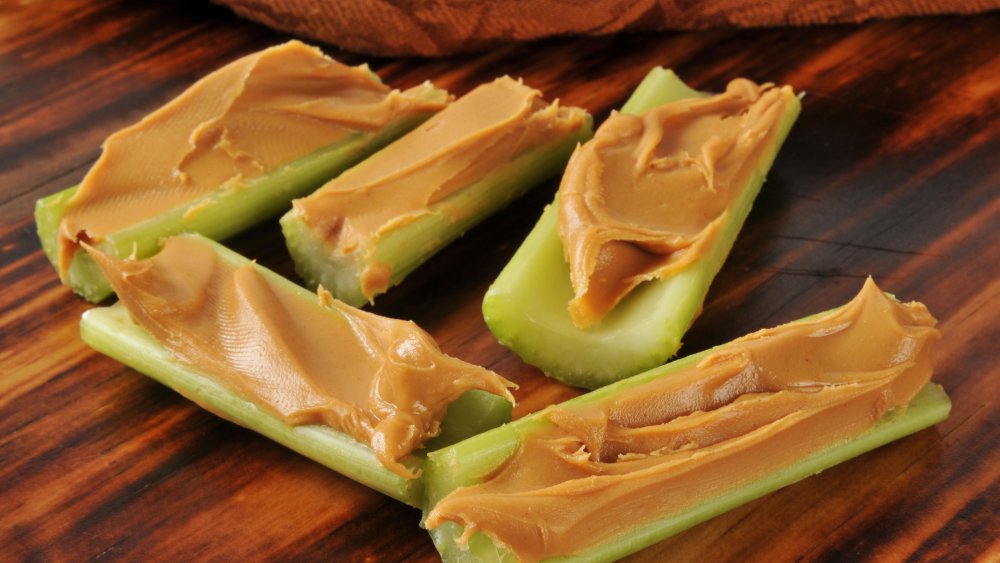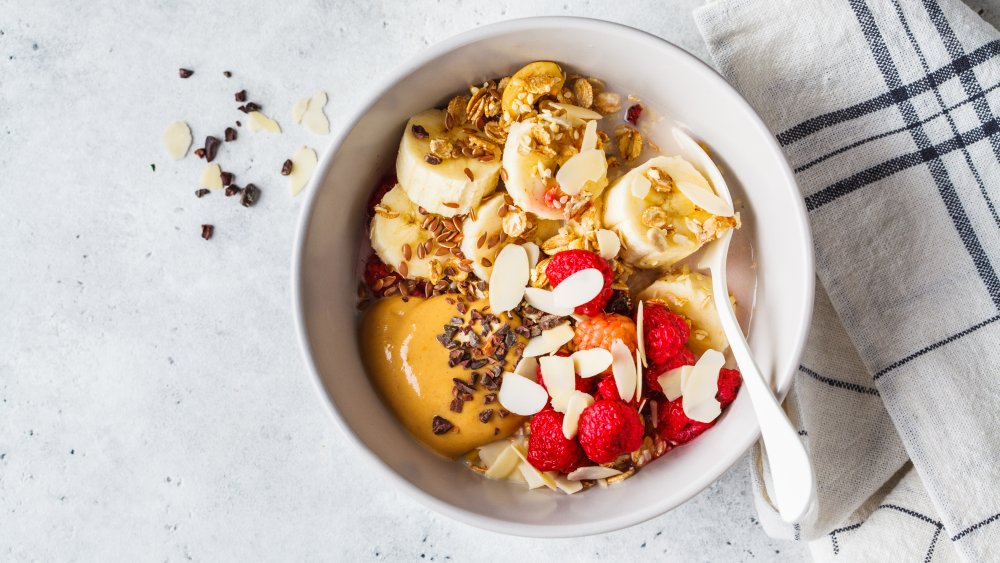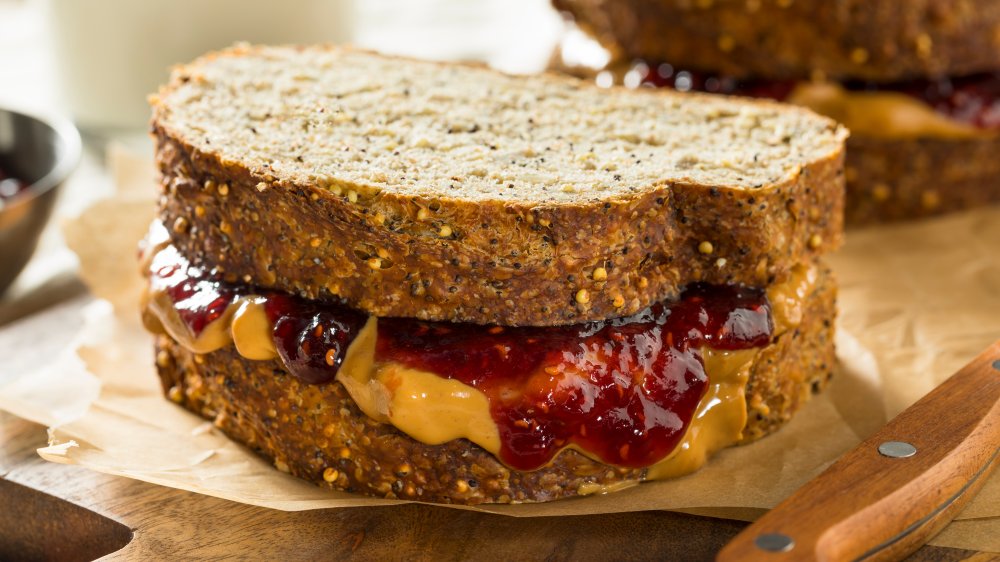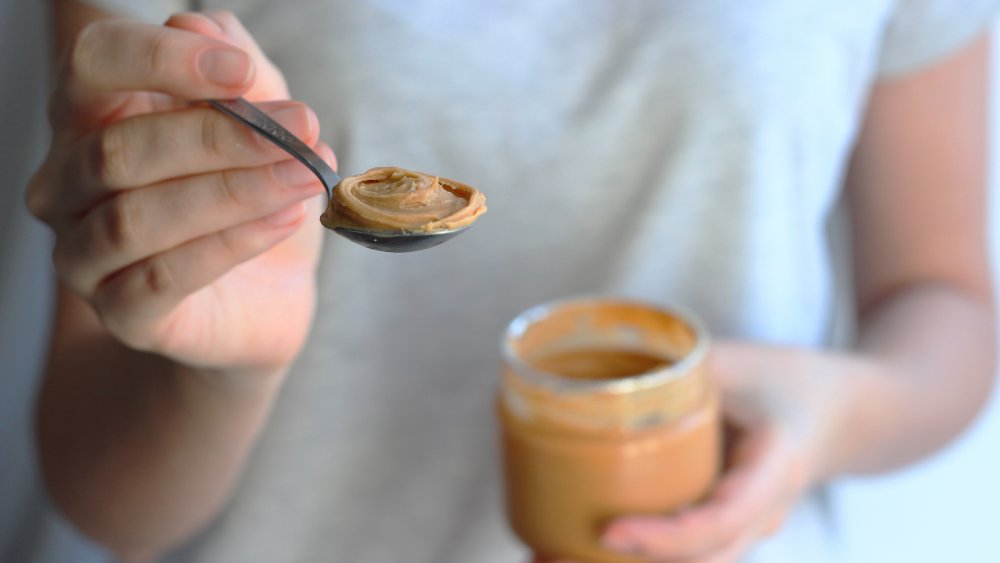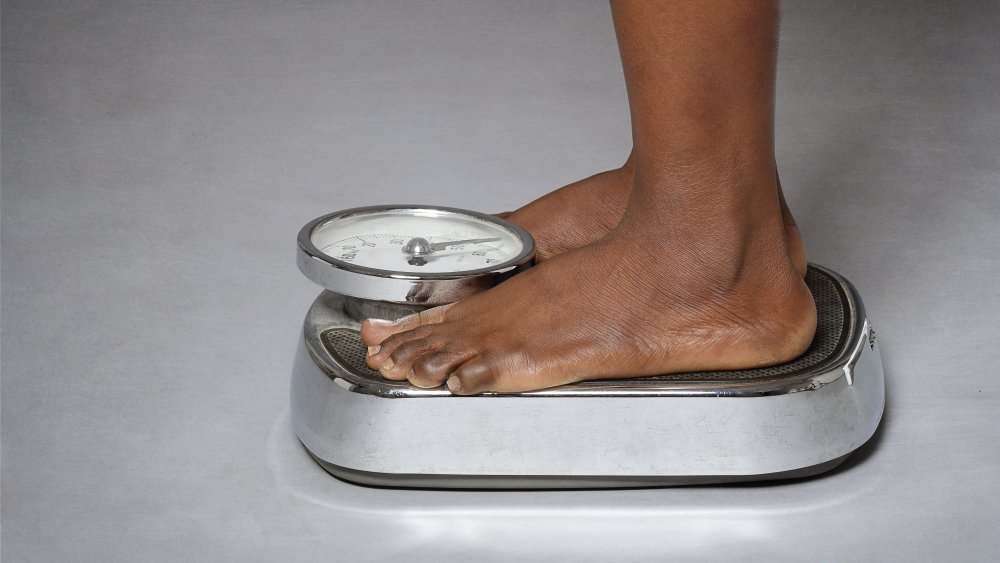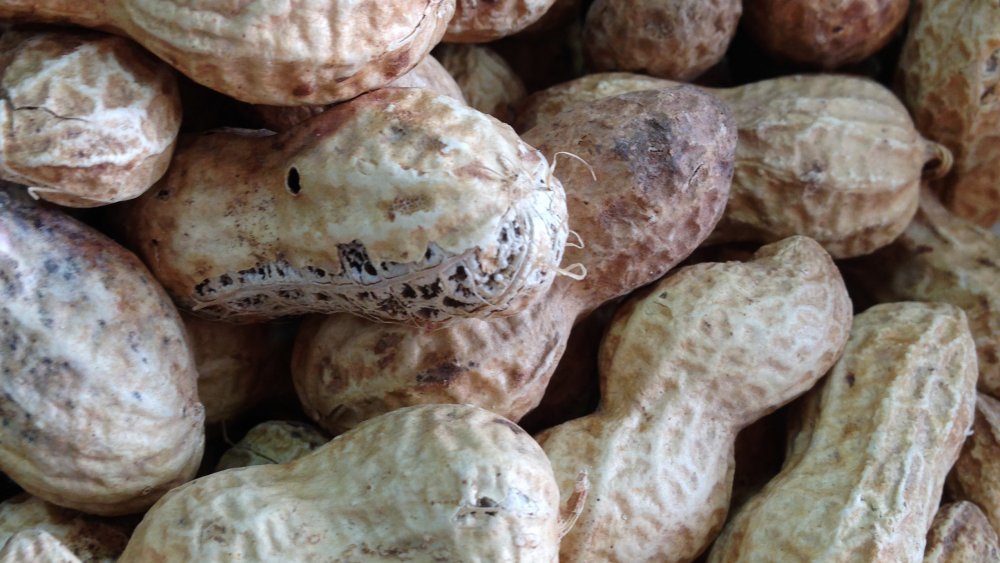When You Eat Peanut Butter Every Day, This Is What Happens To Your Body
Peanut butter has likely been a staple food for you since childhood, back when your parents would make you a peanut butter and jelly sandwich and tuck it lovingly into your school lunchbox. With peanut butter's creamy texture and rich, hearty flavor, it's no wonder why many kids enjoy eating it — and why so many of us continue to love it well into adulthood.
Peanut butter isn't just for sandwiches, of course. You can use it as a protein-packed spread for celery or drop a couple tablespoons of it into your morning smoothie. And you don't need us to tell you that you'll also find peanut butter mixed into candy bars and baked into cookies and brownies. Peanut butter truly is a versatile food, which is great considering it's relatively inexpensive and widely available.
If you're a fan of peanut butter, have you ever wondered what happens to your body when you eat it every day? As it turns out, there are advantages — and disadvantages — of being a daily peanut butter consumer. Read on to find out more.
Your body will get the healthy fats it needs if you eat peanut butter every day
When you read the label on your favorite jar of peanut butter, do you find yourself concerned about the high fat content? You may find yourself especially wary of the fact that it contains saturated fat. However, there's nothing to worry about if you consume peanut butter in moderation every day, according to nutrition professor Dr. Walter C. Willett. "The presence of saturated fat doesn't automatically kick a food into the 'unhealthy' camp," he penned in an article for Harvard University. "It's the whole package of nutrients, not just one or two, that determines how good a particular food is for health," the expert added.
So, how exactly does peanut butter's overall nutritional profile stack up? "One serving (about 2 tablespoons) has 3.3 grams of saturated fat and 12.3 grams of unsaturated fat, or about 80 percent unsaturated fat," Willett continued. "That puts it up there with olive oil in terms of the ratio of unsaturated to saturated fat." Given that many experts extol the virtues of olive oil, being similar in composition is, by extension, a good thing. As the American Heart Association explained, unsaturated fats "[provide] essential fats your body needs but can't produce itself."
If you eat peanut butter every day, your cholesterol levels may improve
According to the American Heart Association, approximately 94.6 million American adults (roughly 40 percent) have total cholesterol levels of 200 mg/dl or higher. Additionally, of those folks, 28.5 million (about 12 percent) have total cholesterol levels higher than 240 mg/dl. If you're looking to get your cholesterol levels down into healthy territory, you may want to consider eating a serving of peanut butter every day. "Peanut butter contains healthy fats, particularly monounsaturated fats," registered dietitian Amanda A. Kostro Miller told The List. "Monounsaturated fats can help increase the good cholesterol in the body."
That's not all, either. Making peanut butter a daily staple in your diet can also help to lower your LDL or "bad" cholesterol, as noted by Harvard University. That's all the more reason to chow down on a peanut butter and banana sandwich on whole wheat bread for a super fulfilling, healthy lunch.
Your heart will be happy if you eat peanut butter every day
The importance of maintaining your heart health can't be overestimated, especially since heart disease is the number one cause of death worldwide, according to the World Health Organization (WHO). Fortunately for peanut butter fans who eat the spread every day, you're taking a stand against cardiovascular disease.
"Peanut butter is made up of more unsaturated fat than saturated fat, and is a plant-based fat which lowers the risk of heart disease and coronary artery disease," certified health and wellness coach Lynell Ross shared with The List. "It also contains p-Coumaric acid that helps balance the damage done to cells from cardiovascular disease."
In addition to those heart-friendly benefits, peanut butter can help you protect your ticker in another way, says Ross. "Lastly, because peanut butter is high in fiber and healthy fat, it helps you feel full longer so it can help you lose weight," she continued. And since losing excess weight can help you prevent heart disease, as noted by the Mayo Clinic, that's just one more reason to love peanut butter.
If you eat peanut butter every day, your mood may get a boost
Let's face it: One of the reasons people love eating peanut butter is because it tastes delicious. Whether you're baking it into some cookies or even just licking it directly off the spoon, the flavor and texture of peanut butter is super satisfying — enough to make you smile after polishing off a serving or two. There's more at work here than just liking the taste, though. Consuming peanut butter on a daily basis can chemically boost your mood, according to certified nutritionist Emily Ziedman.
"This is due to a phytonutrient that is present in peanuts called beta-sitosterol," she explained to The List. "Studies show that beta-sitosterol may improve symptoms of anxiety and depression due to its effect on the neurotransmitter GABA." That explains why you feel just a bit more chipper after eating a meal that's rich in peanut butter. The science proves it!
Eating peanut butter every day can promote satiety
While peanut butter certainly tastes delicious and can be used in a myriad of ways, one of the best things about it is that it can promote satiety. That's important if you want to both establish and maintain healthy eating habits. And, since peanut butter is super filling, you may not need to eat as much of other foods if it's on your daily menu, according to registered dietitian Amanda A. Kostro Miller.
"You can hold off hunger," the expert told The List. "Healthy fats and fiber in peanut butter can help you stay full for several hours." That's certainly preferable to eating the same amount of calories in sugar form, as the sugar won't keep you satisfied for nearly as long.
Even if you already have a meal planned, consider adding a serving or two of peanut butter to it to maximize this benefit. "Adding peanut butter to a smoothie, dessert, toast, or sandwich can help you feel satisfied and prevent early snacking before your next meal," Kostro Miller added.
Your body will get the nutrients it needs if you eat peanut butter every day
Plenty of nutrition experts will tell you that eating a balanced diet is critical for optimizing your health. You have to make sure you eat plenty of vegetables, the right amount of protein, healthy fats, and complex carbohydrates, as noted by Harvard University. Plus, you need micronutrients in order to function at your peak, certified personal trainer Amber Trejo explained to The List. "Peanut butter is a great source of essential minerals and vitamins needed for optimal body functions," she detailed. "It is loaded with iron, folate, potassium, copper, zinc, magnesium, and manganese." That's a lot of minerals in just two tablespoons of peanut butter!
There are other vital nutrients found in peanut butter, according to Trejo, which you need to consume in addition to the minerals listed above. "Peanut butter also is a great source of fat soluble vitamin E and water soluble vitamins B3, B5, and B6, which are needed for cell health and nerve function," she added.
Your blood pressure may improve if you eat peanut butter every day
According to the Centers for Disease Control and Prevention, approximately 108 million American adults have high blood pressure — that's roughly one out of every two people. Even more alarming is that the majority of folks with hypertension don't have it under control. If left untreated, high blood pressure can be deadly, so it's important to be aware of your numbers and where they stack up.
However, if you eat peanut butter every day, you may just be fighting back against the condition already, according to certified nutritionist Emily Ziedman. "Peanut butter is a great source of magnesium and potassium, two minerals that help to control blood pressure and balance sodium," she shared with The List. "High-quality peanut butter in moderation can improve nutrient stores of these important minerals."
Moderation is especially key here, as many peanut butters contain sodium, which can increase your blood pressure, as noted by the American Heart Association. So make sure you're reading your labels and selecting a lower sodium option if need be.
If you eat peanut butter every day, your risk for diabetes may decrease
Diabetes is a condition in which your body is not able to properly process glucose, as noted by Medical News Today. If left untreated, diabetes can lead to a host of other medical problems such as stroke and heart disease. If you're invested in doing everything you can to prevent yourself from getting the disease, consider eating peanut butter every day.
"Research shows if you eat peanut butter daily, your risk of developing type 2 diabetes will go down, particularly if the peanut butter replaces refined carbohydrates or processed foods in your diet," registered dietitian Natalie B. Allen revealed to The List. "Peanut butter, and nuts in general, improve glucose and insulin balance in the body."
Of course, any benefits of peanut butter will be mitigated if you're eating it in the form of peanut butter cookies or peanut butter-filled chocolates because of the sugar content. As such, make sure to stick to healthy snacks like peanut butter spread atop celery or whole grain toast.
Need an energy boost? Eat peanut butter every day
Are you someone who's always on the go because of work, school, or family? Or perhaps you're super into physical fitness and make sure to get a solid workout in as often as possible. In either case, eating peanut butter every day is a wise way to fuel your body. "Calories give us energy, so it's important to consume enough calories for your needs so you can function properly," registered dietitian Amanda A. Kostro Miller told The List. "Since peanut butter is calorie-rich, it is often a good snack to keep you focused."
Even if you're not training for a 5K or working super long hours at the office, you may still find that you need a pick-me-up in the middle of the day. That's why Kostro Miller recommends keeping a jar of peanut butter close at hand. "If you're hungry or in an afternoon slump, try to have a spoonful of peanut butter to perk you up and get focused again," she continued.
You may lower your breast cancer risk if you eat peanut butter every day
Breast cancer is the second most prevalent cancer among American women, according to the Centers for Disease Control and Prevention. Fortunately, if you drop a serving of peanut butter into your smoothie every morning, you might just protect yourself from this disease.
"Eating peanut butter, especially from a young age, may reduce the risk of benign breast disease (BBD), which increases the risk of breast cancer," counselor and psychotherapist Jayne Leonard penned in an article for Medical News Today. "A study in the journal Breast Cancer Research and Treatment reports that eating peanut butter and nuts at any age may result in a lower risk of developing [BBD] by age 30."
Peanut butter is such a powerful weapon against breast cancer that it can make a difference regardless of your genetics, wrote Leonard. "Even those with a family history of breast cancer had a significantly lower risk if they ate peanut butter," she added.
Eating peanut butter daily can decrease chronic inflammation
According to Healthline, "superfoods" don't really exist, as the term was made up by marketing executives in order to sell products and have an influence on food trends. That being said, the publication noted that there are still foods that are worthy of the title — and peanuts are definitely among them. That's thanks to their antioxidant and anti-inflammatory properties.
If you want to make sure that you're getting enough superfoods in your diet, eating peanut butter every day is a great idea. Doing so can also protect you from all kinds of maladies, according to registered dietitian Trista Best. "Antioxidants work to reduce free radical damage in the body, which leads to inflammation and eventually chronic diseases," she shared with The List. "Eating peanut butter daily is a great way to get in disease fighting compounds." For maximum benefits, you can combine peanut butter with other superfoods, such as berries and yogurt, as long as you can find a flavor profile that works for your palate.
You may be consuming toxins if you eat peanut butter every day
It's abundantly clear that there are a ton of health benefits — including reducing inflammation — that come with eating a serving or two of peanut butter every day. However, there are some disadvantages that can result from consuming it often, such as the accidental ingestion of mold toxins. "Aflatoxins are produced by fungi as the peanuts grow," certified nutritionist Katie Boyd explained to The List. "Long-term exposure to this toxin can cause severe inflammation in the body and autoimmune disease." Um, yikes!
Additionally, aflatoxins can cause another dangerous disease, according to Boyd. "Long term there have been links to liver cancer as well as impaired growth in children," she continued. Fortunately, when peanuts are turned into peanut butter at processing plants, aflatoxins are reduced by 89 percent, according to a study published in Food and Nutrition Sciences. Plus, as Healthline noted, the USDA monitors foods regularly to make sure aflatoxins are not present in excess. That's good news for die-hard peanut butter lovers!
You may gain weight if you eat peanut butter every day
Certified personal trainer Sergio Pedemonte has no problem with his clients eating peanut butter every day, thanks to its nutrient dense content. However, he cautions that it's important to exercise a bit of restraint around it, as a little dab will do you just fine. "You can gain weight from eating peanut butter every day," he shared with The List. "Peanut butter is calorie-dense, so it's easy to go over your daily caloric limit if you don't pay attention." If you have a way to measure how much you spread onto your toast or add to your smoothie, however, you can easily avoid that pitfall.
While gaining pounds can be beneficial if you're lifting weights and trying to pack on muscle, it's not an ideal situation if you're trying to diet. So if you're working to slim down, Pedemonte recommends sticking to a single serving every day and carefully tracking calories to avoid overindulging.
If anyone in your household is allergic to peanuts, avoid eating peanut butter every day
While peanut butter may be a popular and nutritious food suitable for many diets, if you're allergic to peanuts you should also obviously avoid peanut butter as well. Even if you're only a little concerned about having this food allergy, steer clear, according to registered dietitian Jill Castle. "A peanut allergy can cause a mild stomachache, a rash, or it may cause life-threatening breathing or heart problems," she wrote in an article in Verywell Health. "There are medical ways to reduce the effects of a peanut allergy after they occur, but the best way to stay safe is to avoid peanuts and products that contain peanuts."
The same rules also apply to folks who have loved ones afflicted by the condition, noted Castle. "Even if you don't have a peanut allergy, you are likely to interact with people who could develop a serious reaction to peanut exposure," she continued. That's the best way to protect folks who simply can't tolerate exposure to the legume in any form.
